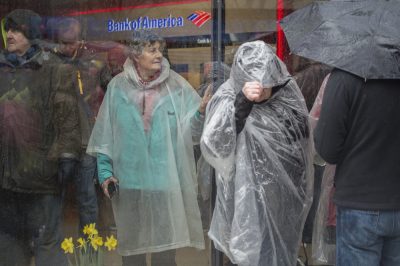
Remember to close your windows and hold your umbrellas tight, because the region’s first nor’easter of the season is set to pummel the Massachusetts coast through Friday. Expect heavy rains and strong gusts, which may bring power outages and even slight flooding to the Boston area.
The nor’easter began showering Massachusetts on Wednesday, with conditions are expected to steadily worsen until Thursday, peaking Thursday afternoon into the evening, according to the National Weather Service. Conditions are expected to subside Friday through Saturday, sparing residents from a stormy Columbus Day holiday.
In a tweet, the Boston Office of Emergency Management told residents to stay cautious and, if possible, limit their time travelling outdoors. The OEM also urged residents to sign up for emergency alerts at Boston.gov/alert-boston in case of unexpected developments.
The Southeast region of Massachusetts is expected to take the brunt of the storm, with some areas expecting to be soaked by up to eight inches of rain through Saturday, according to NWS Boston.
As for Boston, forecasts predict that the city will receive anywhere from four to six inches of rain, causing the NWS to issue a flood watch for Boston’s Suffolk County as poor drainage and storm surge may lead to water buildup in urban areas bordering the coast, according to NWS Boston.
Storm surge is expected to reach anywhere from 1.5 to 2.5 feet in some areas along the coast.
The flood watch, which also affects the Boston area cities of Quincy, Norwood and Foxboro, took effect at 8 p.m. Wednesday night and is scheduled to be called off Friday morning, according to NWS Boston.
Additionally, the NWS warned Boston residents to take extra care to protect themselves from “strong to damaging winds” that may cause scattered power outages and downed tree limbs, made worse by the fact that Boston’s trees are still fully leaved.
“The leaves provide additional resistance to the wind blowing through the branches,” NWS Boston wrote in a tweet. “Weaker branches, or even a few trees, may not be able to handle the additional stress. When those start coming down, the risk for hitting a power line and causing an outage is increased.”
The OEM tweeted Wednesday afternoon that the city is also expecting gusts at speeds of up to 40 miles per hour. The OEM urged Boston residents to take precautions against flooding, especially if their property lies in a flood zone.
NWS Boston also warned boaters to take caution when sailing off the Massachusetts coast, as the nor’easter is expected to bring 15 to 25 foot waves and winds of up to 70 miles per hour in the state’s outer waters.
What is a nor’easter?
Nor’easters are storms that usually occur along the Eastern Seaboard. While they can happen anytime during the year, they are at their most violent and most frequent between the months of September and April, according to the NWS
These extra-tropical cyclones form off the coast when warm air from the south and cold air from the north collide, forming a temperature difference that acts as fuel for the storm, according to the NWS. This makes the east coast perfect for nor’easters, as the polar jet stream pushes cold air from Canada southward while warm air travels north along the Gulf stream.
Nor’easters typically bring heavy rain or snow, depending on the season, and tend to travel north toward New England, reaching their peak over the northeastern United States, according to the NWS.
One particularly severe nor’easter, called the Northeastern United States Blizzard of 1978, dropped so much snow that many spectators of the 26th annual Beanpot tournament were stranded in the arena for days, surviving on hot dogs and sleeping in the bleachers, according to the Boston Globe.
In honor of National Newspaper Week, we’re asking you to make a donation to The Daily Free Press. The financial support of our community is important now more than ever to help us continue writing stories like this for readers like you. Please chip in whatever you can. Read more and make a donation here. Thank you.






















































































































